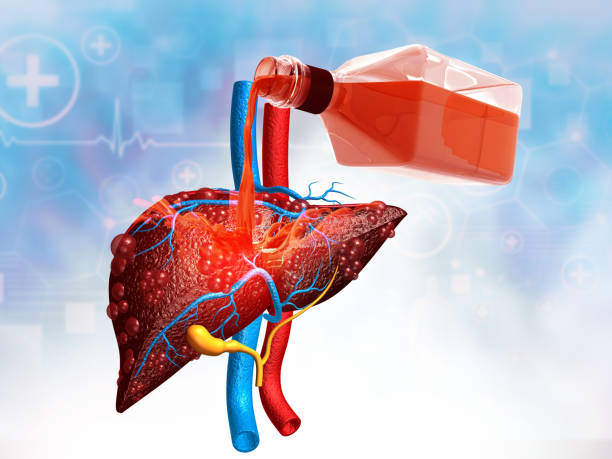Visitors have accessed this post 107 times.
Table of contents:
Introduction
Understanding Alcohol
The Effects of Alcohol on Our Body
Types of Alcoholics
Signs of Addiction
Health Problems Caused by Alcohol
Challenges of Quitting Alcohol Abruptly
The Taper-off Method
Avoiding Relapse
Family Support
Conclusion
Introduction:
 Many people want to quit alcohol, but they often don’t know how to start. It’s important to understand that quitting alcohol addiction is not something that happens overnight. Before we delve into the journey of overcoming alcohol addiction, let’s first grasp what alcohol does to our bodies and why it’s crucial to kick this harmful habit.
Many people want to quit alcohol, but they often don’t know how to start. It’s important to understand that quitting alcohol addiction is not something that happens overnight. Before we delve into the journey of overcoming alcohol addiction, let’s first grasp what alcohol does to our bodies and why it’s crucial to kick this harmful habit.
Understanding Alcohol:
Alcohol comes in various forms like beer, wine, rum, whiskey, vodka, and more. Each of these beverages contains varying levels of alcohol content, with some having as much as 95%. It’s astonishing to think that we consume a substance that can catch fire when in contact with flames.
The Effects of Alcohol on Our Body:
- Imagine having one bottle of beer, a glass of wine, or 30 ml of rum, whiskey, or vodka. When you consume it, within 10 minutes, alcohol enters your bloodstream, reaches your brain, and then moves to your liver.
 The liver plays a crucial role in detoxifying alcohol. Typically, it takes about an hour for the liver to process 30 ml of alcohol. However, if you consume more than this amount, your liver can’t keep up, and the excess alcohol remains in your blood and brain. This excess can lead to uncontrollable behavior, often resulting in various crimes in society.
The liver plays a crucial role in detoxifying alcohol. Typically, it takes about an hour for the liver to process 30 ml of alcohol. However, if you consume more than this amount, your liver can’t keep up, and the excess alcohol remains in your blood and brain. This excess can lead to uncontrollable behavior, often resulting in various crimes in society.
Types of Alcoholics:
There are three main categories of alcoholics:
1. Severe drinking: Daily excessive alcohol consumption.
2. Moderate drinking: Regular alcohol consumption.
3. Social drinking: Occasional alcohol consumption.
All of these are hazardous behaviors that can have severe consequences on one’s health and life.
Signs of Addiction:
How do you know if you’re addicted to alcohol? Here are some telltale signs:
• Consuming alcohol excessively.
• Craving alcohol as soon as you wake up in the morning.
• Waking up without a hangover (because regular drinkers build a tolerance).
• Spending time with other heavy drinkers.
• Secretly drinking at home.
• Believing that you can only function with alcohol.
• Decreased productivity and attention at work.
Health Problems Caused by Alcohol:
Alcohol addiction can lead to a host of health problems, including heart issues, liver damage (despite the liver’s regenerative capacity, it can’t withstand chronic alcohol abuse), stomach ulcers, elevated blood sugar levels, birth defects in newborns (due to maternal alcohol consumption during pregnancy), cancer, osteoporosis, weakened immunity, disrupted sleep patterns (affecting memory), and a tarnished reputation within society.
Challenges of Quitting Alcohol Abruptly:
Suddenly quitting alcohol can bring about various withdrawal symptoms, such as palpitations, headaches, tremors, vomiting, insomnia, sweating, diarrhea, anger, depression, and hallucinations (a form of mental illness). Delirium tremens, a severe withdrawal syndrome, may occur 42-78 hours after quitting and includes confusion, hallucinations, increased blood pressure, fever, and profuse sweating. Seeking medical advice is crucial if you experience these symptoms. To mitigate these risks, here’s a structured approach to gradually quit alcohol:
The Taper-off Method:
Reducing alcohol consumption gradually can help prevent severe withdrawal symptoms. Let’s take an example: if you currently drink 360 ml of alcohol daily, divide it into 60 ml portions. In the first week, drink 60 ml six times, in the second week, reduce it to five times, and so on. Over six weeks, you’ll decrease your alcohol intake to once a day. If you’re a severe addict, you can start with 30 ml portions, reducing by 30 ml each week over 12 weeks. It’s crucial to inform your loved ones about your journey to quit alcohol. This ensures they understand your challenges and can provide support during this time.
Avoiding Relapse:
Even after successfully detoxifying your body, cravings may persist. It’s essential to stay in control because relapsing can make you even more addicted than before. While a government ban on alcohol might seem like a solution, self-control remains the key. We may engage ourselves in some other activities which we are interested in, like gardening, reading books or something else to distract our alcohol carvings. Joining support groups like Alcoholics Anonymous (AA) can be incredibly beneficial for those struggling with alcohol addiction, as well as groups like Al-Anon for family members and Ala-Teen for teenagers affected by a loved one’s alcoholism.
Family Support:
 Family members of individuals battling alcohol addiction should provide emotional support. Yelling or scolding someone who is intoxicated is counterproductive since they are not in control of their actions. Offering understanding and encouragement can make a significant difference in their recovery journey.
Family members of individuals battling alcohol addiction should provide emotional support. Yelling or scolding someone who is intoxicated is counterproductive since they are not in control of their actions. Offering understanding and encouragement can make a significant difference in their recovery journey.
Conclusion:
Overcoming alcohol addiction is a challenging but achievable goal. It requires determination, the support of loved ones, and possibly involvement in support groups like AA and Al-Anon. The taper-off method provides a structured way to reduce alcohol consumption gradually, ultimately leading to a healthier, happier life free from the grip of addiction. Remember, with the right approach and a strong support system, you can conquer alcohol addiction and regain control of your life.
